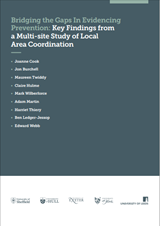Bridging the Gaps In Evidencing Prevention: Key Findings from a Multi-site Study of Local Area Coordination

This evaluation report by the University of Hull examines the key benefits across four Local Area Coordination (LAC) projects overseen by Community Catalysts and the LAC Network. Funded by the NIHR School for Social Care Research, the findings show that LAC works on a number of different fronts, from system level to community and individual level impacts. Furthermore, 19% of LAC activities involve housing and financial issues.
In relation to prevention, the report evidences how LAC:
- offers a pathway to move away from intensive time-restricted support and to explore how longer term, more holistic support can help to build insulators for individuals to feel better able to navigate challenges and reduce reliance on services through the confidence of knowing that support is ‘there’ if and when they need it
- provides ‘strength-based’ resources to services, individuals and communities enabling better connections, insights and reach, and improved outcomes for individuals
- being viewed as a safe place to cut is highly problematic and risks diminishing the impact of programmes best able to integrate support across services and sectors, and reach deep into communities, and that
- coordination via the LAC Network is an important vehicle for implementing consistent tools across member authorities.
In addition to downloading the evaluation report below, you can access an executive summary and a blog (opens new window), the latter published by Community Catalysts to coincide with the report’s publication.
